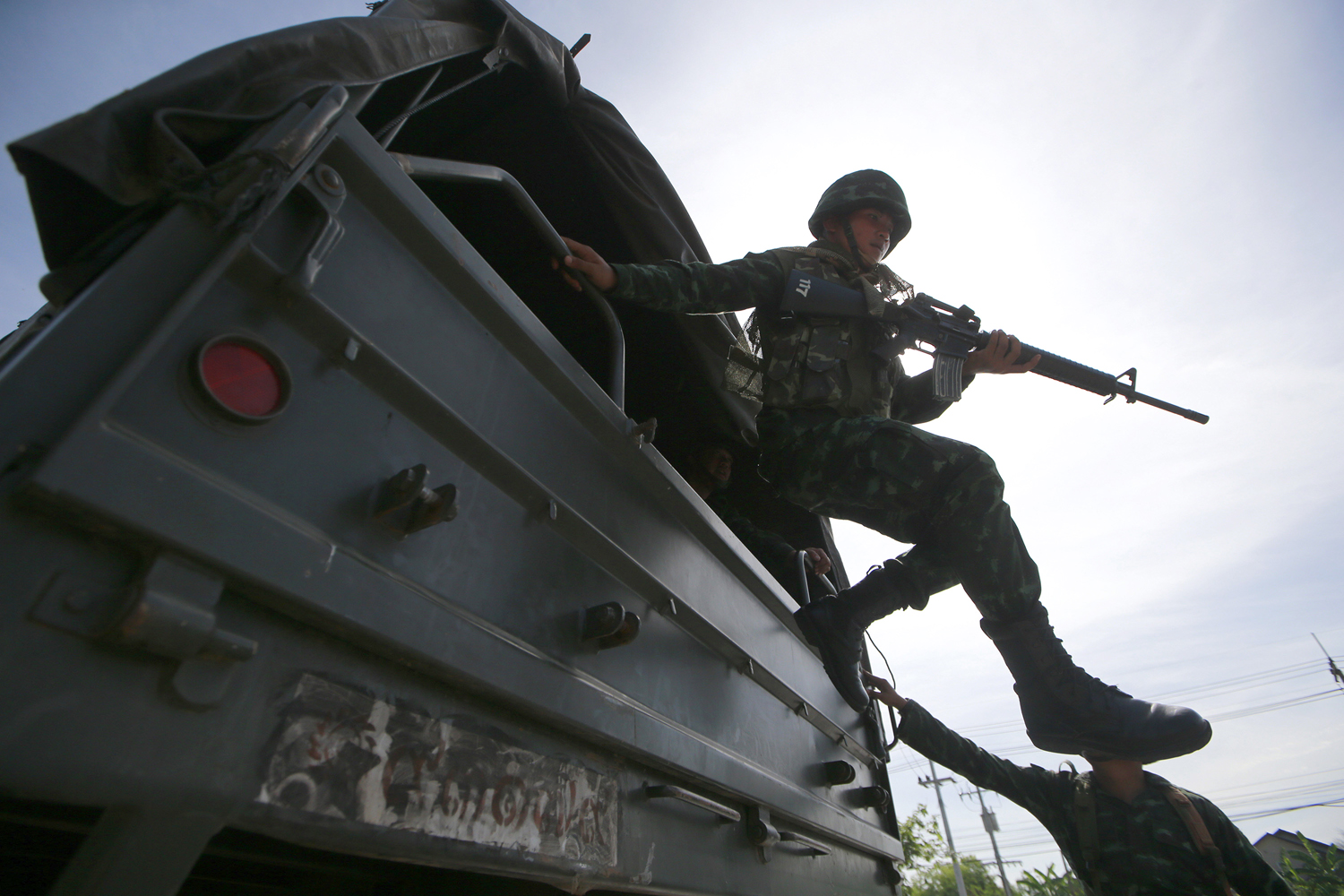
Protesters were ordered to disperse, media censored and military vehicles positioned around key intersections in the Thai capital on Tuesday, as the country’s armed forces consolidated their grip on the nation’s reins of power. This is nothing new for the most coup-prone country in the world. Excluding this current incursion, there have been 11 putsches in Thailand and seven coup attempts since the fall of absolute monarchy in 1932.
Even today, the Martial Law Act 1914 gives the army “superior power” over civilian institutions regarding maintaining public order and security. And so despite 82 years of flirting with various forms of democracy, Thailand has never really been able to keep the military in the barracks or politicians in office for very long.
Here are four coups that help explain why:
The End of Royal Rule
Coup season officially began in Thailand with the overthrow of the absolute monarchy through a bloodless revolt on June 24, 1932. Led by members of the military, civilian servants and ambitious elites, the plot put an end to seven centuries of outright royal rule.
A provisional constitution was implemented to strip the King of his political powers — commencing the country’s ongoing experimentation with constitutional monarchy and parliamentary elections. But within years, limited power was gradually restored to the King and Thailand’s deep-set feudal order was maintained.
Foundation of Nationalism
A short-lived civilian administration followed the end of Japanese occupation, but the military stepped back into Thailand’s political landscape in 1947 amid corruption scandals and the suspicious death of the country’s young King. This coup allowed for the return of wartime strongman and rabid nationalist Field Marshal Plaek Phibunsongkhram.
He is perhaps best known for providing the country, formerly known as Siam among other provinces, with its current name in a bid to promote the Thai ethnicity as central to the country’s identity. But myriad nationalistic campaigns were launched during his rule, which included the creation of the now famous national dish, Pad Thai. Phibunsongkhram’s actions most acutely demonstrate the military’s paramount role in forging a national identity from the kingdom’s diverse populace.
His hard-line conservative sensibilities would also eventually put the country firmly in the good graces of the U.S., which would later rely on Thai air bases to run bombing sorties over Indochina during the Vietnam War.
The Military’s Violent Return
Three years after a popular uprising ended decades of military rule, the army came back into power through violent intervention on Oct. 6, 1976. In one of the darkest chapters of the country’s history, right-wing paramilitary groups stormed a demonstration at the elite Thammasat University outside Bangkok, where students had been protesting the return of former military ruler Thanom Kittikachorn to Thailand.
Dozens of students were slaughtered and more than 100 injured during the grisly episode. Following the massacre, a junta again seized power.
The attack on the students was largely predicated on stamping out perceived leftist tendencies. Before the crackdown, the protesters were portrayed as anti-royalists in the press, which helped feed hysteria among the Establishment, who feared that Thailand could be the next dominion to fall to communist insurgents on the heels of America’s withdrawal from the region.
Thaksin’s End in 2006
On Sept. 19, 2006, the Thai military launched its last successful military coup to oust popularly elected Prime Minister Thaksin Shinawatra. The billionaire former police officer was in New York City attending the U.N. General Assembly at the time. The putsch incensed the rural masses and urban working class who voted Thaksin into office and continue to hold him in high regard for populist welfare initiatives.
However, alleged venality in Thaksin’s administration and a perceived lack of respect for the beloved King Bhumibol Adulyadej enraged royalists and the urban middle classes, who chafed at seeing their long-standing influence erode and put considerable pressure on the military to oust the Prime Minister.
The generals cited threats to national unity as grounds for the coup, but the move was largely seen as an effort to preserve the power of the Establishment. Indeed, the removal of Thaksin ended up driving an irreconcilable wedge into Thai society and sent the country hurtling into perpetual political crisis that analysts warn may still end in civil war.
More Must-Reads from TIME
- Cybersecurity Experts Are Sounding the Alarm on DOGE
- Meet the 2025 Women of the Year
- The Harsh Truth About Disability Inclusion
- Why Do More Young Adults Have Cancer?
- Colman Domingo Leads With Radical Love
- How to Get Better at Doing Things Alone
- Michelle Zauner Stares Down the Darkness
Contact us at letters@time.com